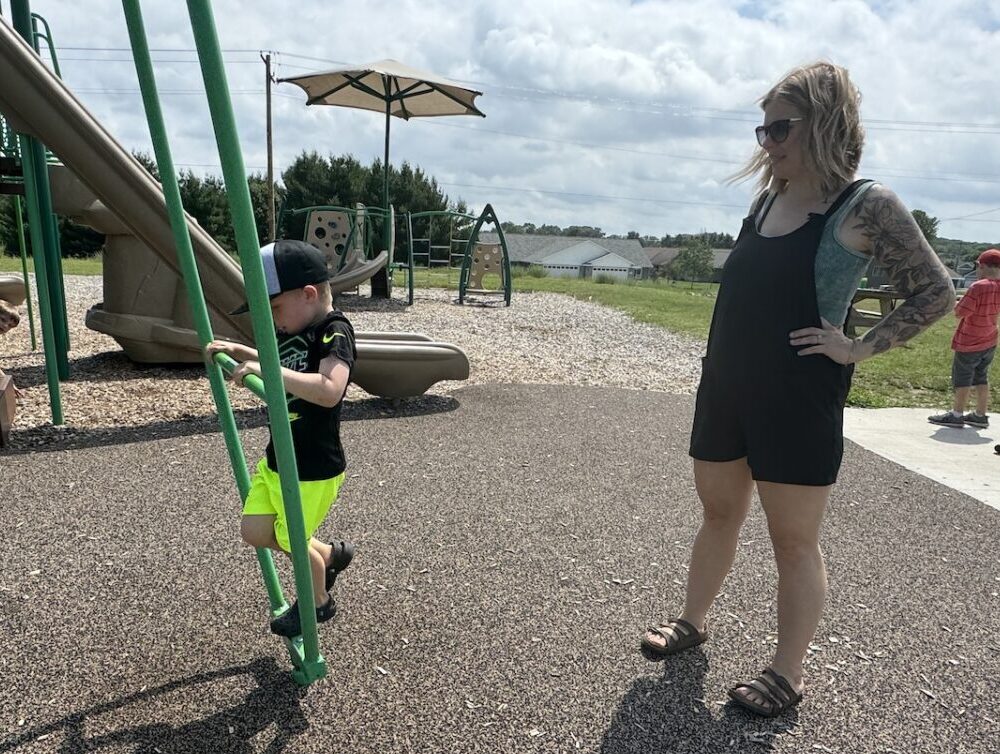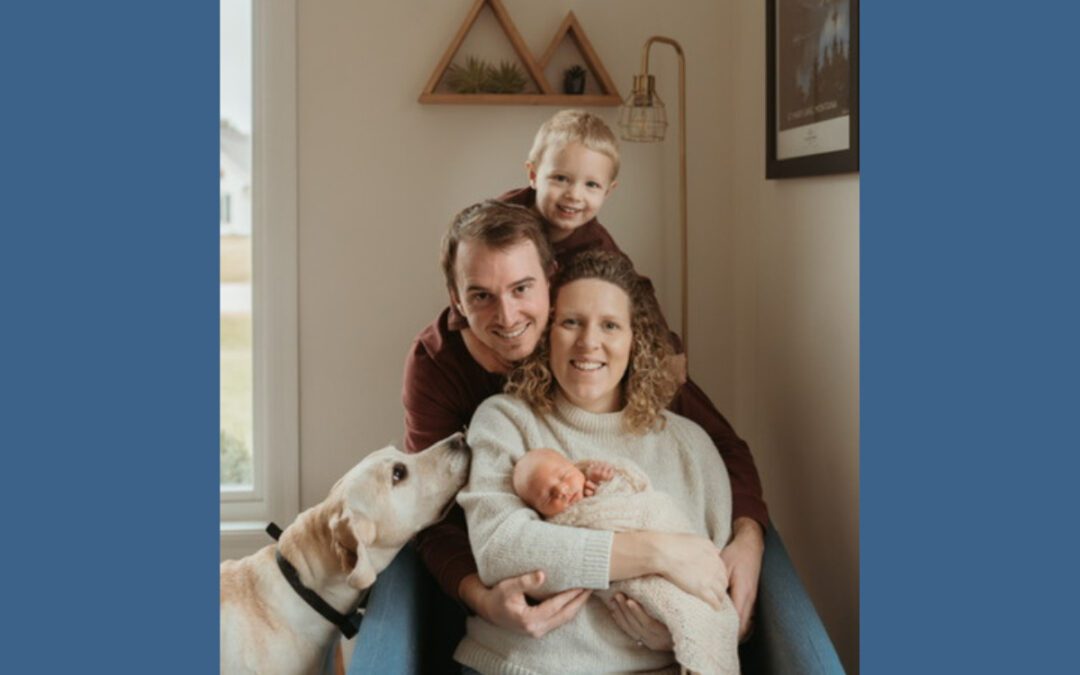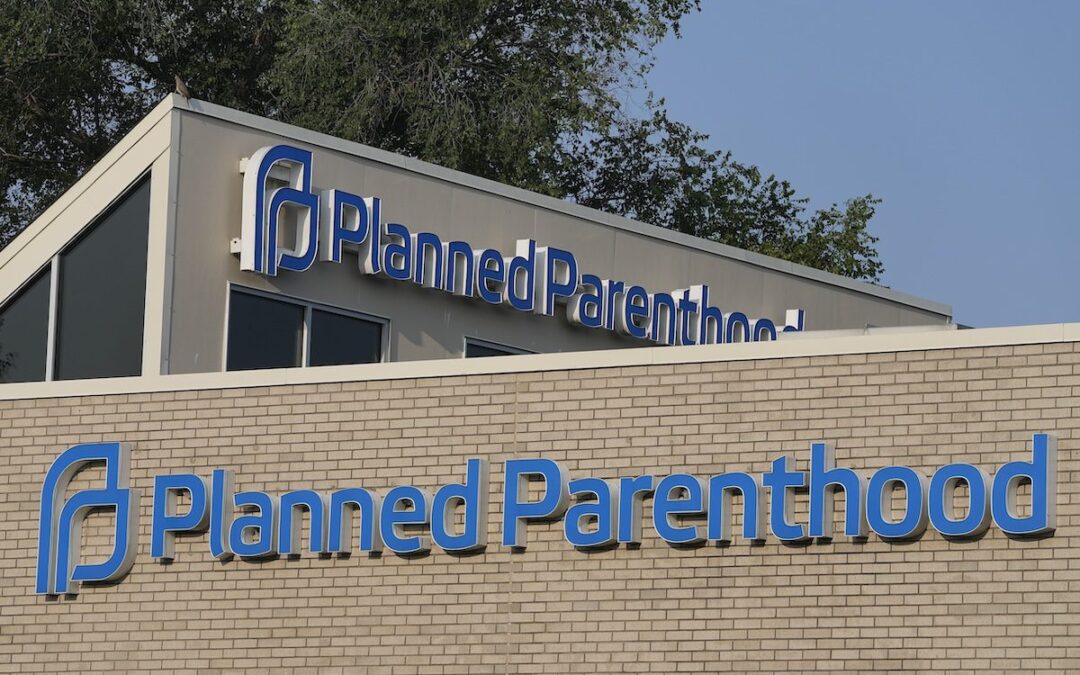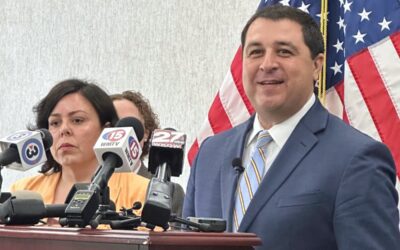
Brit Poplawski and her son Watson play in Eau Claire. Brit is a gestational surrogate, due in November, with a couples’ second child.
Photo by Salina Heller
In a surrogacy pregnancy, a gestational carrier, called a surrogate, carries and delivers a baby for the intended parents.
It’s a warm, sunny day and 5-year-old Watson Poplawski and his mom are laughing and playing at a public park in Eau Claire.
“Go to the slide,” his mom encourages him. “”I’ll meet you at the bottom!”
As Watson gingerly comes down the slide at a turtle’s pace, he tries to slow himself even more. His mom gives him a knowing smile. “You’re going to break your leg that way,” she teases. “If you think I haven’t seen it, you’re wrong!”
Brit Poplawski is a full time ER nurse on the weekends. She’s also a full time doctoral student during the week. And in between all of that, she’s in the middle of her second gestational surrogacy for another family.
“I don’t have time to think about it,” Brit said. “I tell them, ‘I’m just along for the ride!’”
Making the decision to become a surrogate
While she jokes, Brit—given her medical background—has likely studied up on surrogacy more than most people. Even Watson understands the plan—he knows the baby in his mom’s belly is for a different family.
“We have a lot of friends who have struggled with their own infertility issues and we have same-sex couple friends who can’t have a baby without the help of somebody else,” Brit said. “I wanted to help in a way that I could.”
Knowing her own family was complete with two boys and a stepson, Brit and her husband started looking into surrogacy a few years ago. “Both of my own pregnancies were phenomenal and easy pregnancies,” she said. “And not everyone wants to drop everything and be pregnant for somebody else.”
“It was a way I could help someone else and help my family at the same time.”
The Poplawskis knew it was important to fully understand and prepare for all of the steps of the process, so they chose to use the guidance of a surrogacy agency.
And knowing that surrogacy is often the only family building option that allows many LGBTQ+ couples to have children, they selected an agency.
“I actually picked an agency that worked specifically with same-sex couples,” Brit said.
Wisconsin is surrogacy friendly
Wisconsin is a “surrogacy friendly” state. That’s because the Wisconsin Supreme Court ruled in 2013 that contracts between intended parents and surrogates are protected and enforceable. This isn’t the case for all states in the US.
Compensation isn’t legal in every state that allows surrogacy, but it is here. One Wisconsin agency said it requests a base compensation between $35,000 and $40,000, while total compensation is around $60,000.
Most surrogacies that happen in Wisconsin are gestational surrogacies—which means the surrogate shares no genetics with the baby she carries.
An embryo is created through in vitro fertilization using the sperm and egg from the intended parents or donors. Then the embryo is transferred to the surrogate’s uterus.
That’s the process that Brit has undergone, once in 2022 and again in 2024, for the same family—a gay couple from the Chicago area who have been together for more than 20 years.
“That’s one thing I think a lot of people don’t understand,” Brit said. “Gestational surrogacy—I have no relation to the baby whatsoever.”
For her intended parents, sperm was used from one of the dads, and they found an egg donor to help create the embryos.
“Most people think it was my eggs to do IVF,” Brit said. “People always ask, ‘How hard was it to give up the baby?’ I just tell them, ‘It’s not my baby.’”
Knowing the risks
Pregnancy can be overwhelming, and while there are the regular side effects of nausea, heartburn, and back pain, there’s another set of risks with IVF surrogacy and multiple gestations.
“People jump into it without understanding the risks—that’s what I really try to get people to stop and think about,” Brit said. “A lot of people don’t understand the serious nature of surrogacy. You have to be willing to compromise your own fertility.”
Brit experienced a postpartum hemorrhage with the couple’s first baby—that’s a serious condition where a woman has heavy bleeding after giving birth. It’s not related to being a surrogate carrier, but does happen more frequently to people who’ve had it before—so it’ll continue to be a risk factor if Brit decides to get pregnant in the future. And that’s why she and her doctor developed a plan to try to avoid it happening again.
Surrogates also face increased risks from the in vitro fertilization process and any other medical procedures they undergo to help the pregnancy be successful.
A surrogate’s health risk is even greater, Brit says, in states where women’s health care has been greatly limited because of political efforts to restrict abortion care options.
“If I were in a state where—if something went wrong, or I had an ectopic pregnancy or a missed miscarriage, and there was nothing I could do about it but wait until it’s bad enough that my life was in jeopardy—I would not even consider being in the position I’m in now,” Brit said.
“Pregnancy and labor and delivery are risky. The statistics in the United States are disgusting. You have to consider that. I would not even begin to consider surrogacy in a state with restricted abortion laws.”
Seeing the rewards
Brit is due in November, exactly two years since she delivered the couple’s first baby, a son. Brit said things have changed a lot since the families have met—not only in their growing bond and friendship but in the way they want people to know about these life-changing events.
“They originally wanted to be more private about it, but after their first baby was born their thoughts were, ‘We want you to tell everybody because this has been such a blessing,’” Brit said. “They’ve seen how much of an impact it’s had on their life.”
The intended parents travel to Eau Claire to attend doctor appointments, and the Poplawskis drop by to visit the couple and baby when they’re in the Chicago area.
The families are both grateful to have come together for the emotional journey. Brit said she was touched by a thoughtful gesture from one of the intended dads: “He gave me a little gift when he was just here for an appointment and a note that said, ‘You’ve helped us grow our family beyond what we could imagine.’”
She added that the connections between their two families have deepened through some of life’s most moving experiences.
“I can distinctly remember—both dads were in the delivery room—they were around the incubator,” Brit recalled. “It was so beautiful to watch that and to know that I was a part of achieving the family they wanted to have.”
“I looked at my husband and said, ‘So worth it!’”
Support Our Cause
Thank you for taking the time to read our work. Before you go, we hope you'll consider supporting our values-driven journalism, which has always strived to make clear what's really at stake for Wisconsinites and our future.
Since day one, our goal here at UpNorthNews has always been to empower people across the state with fact-based news and information. We believe that when people are armed with knowledge about what's happening in their local, state, and federal governments—including who is working on their behalf and who is actively trying to block efforts aimed at improving the daily lives of Wisconsin families—they will be inspired to become civically engaged.


AI chatbots are spreading abortion misinformation to Wisconsinites—and lawmakers are fighting back
Cybersecurity experts and state lawmakers want to ensure that Wisconsin residents have access to accurate abortion information online—even if that...

Wisconsin mom exposes painful reality of abortion laws after tragic pregnancy loss
Abortion may be legal in Wisconsin, but the hurdles still involved forced mom Gracie Ladd, 33, to flee the state anyway. She shared her story with...

Women and doctors on latest abortion restrictions: Get out
Candidate for governor Tom Tiffany tries to imply he’d maintain current law, but his record and rhetoric show that Wisconsin could see a total...

Meet Milwaukee’s new abortion clinic—and its determined medical director
In this interview, the medical director of Milwaukee’s new, independent, non-profit abortion clinic is referred to as Dr. A for safety reasons. “My...





